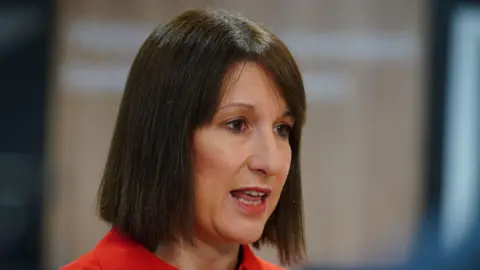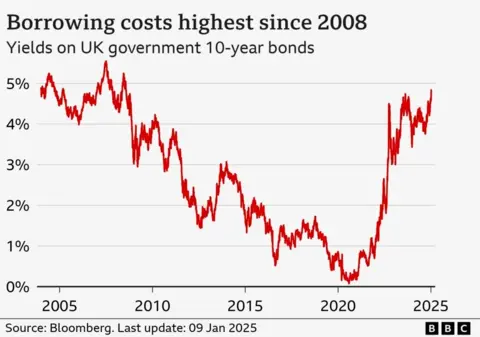Reeves' China trip defended after borrowing cost nerves
 PA Media
PA MediaIt is "absolutely right" that Chancellor Rachel Reeves' trip to China go ahead as planned, a cabinet colleague has said.
Opposition parties had called for Reeves to cancel the three-day visit, aimed to boost trade and economic ties, after the pound fell to its lowest level in over a year, while UK borrowing costs hit their highest for 16 years.
But Culture Secretary Lisa Nandy said the chancellor should take seriously the UK's relationship with China, the world's second largest economy.
Nandy said the rise in borrowing costs was "a global trend that we've seen affecting economies all over the world".
"We are confident that we're taking both the short-term action to stabilise the economy but also the long-term action that is necessary to get the economy growing again," she told the BBC.
Higher government borrowing costs have led to fears that further tax rises or spending cuts could be on the horizon as the government tries to meet its self-imposed rule not to borrow to fund day-to-day spending.
Lower-than-expected spending on public services could affect things like health, education and welfare.
Yields on government bonds, which have been rising in recent months, climbed again on Friday.
The pound, which fell to its lowest level in more than a year on Thursday, also dipped at the market open.
On Thursday, the Treasury ruled out any emergency intervention in the markets, saying they continued to "function in an orderly way".
Travelling to China with the chancellor are senior financial figures, including the governor of the Bank of England and the chair of HSBC.
There she will meet China's Vice Premier He Lifeng in Beijing before flying to Shanghai for discussion with UK firms operating in China.
The government is looking to revive an annual economic dialogue with China that has not been held since the pandemic.
Ties have been strained in recent years by growing concerns about the actions of China's Communist leaders, allegations of Chinese hacking and spying and its jailing of pro-democracy figures in Hong Kong.
The Conservatives and Liberal Democrats have criticised the chancellor for proceeding with the planned trip rather than staying in the UK to address the cost of government borrowing and slide in the value of the pound.
Shadow chancellor Mel Stride accused Reeves of being "missing in action".
However, former Chancellor Philip Hammond told the World at One programme on Thursday that he "wouldn't personally recommend the chancellor cancels her trip to China. This can wait until she gets back next week."

Governments generally spend more than they raise in tax so they borrow money to fill the gap, usually by selling bonds to investors.
Interest rates - known as the yield - on government bonds have been going up since around August, a rise that has also affected government bonds in the US and other countries.
The yield on a 10-year bond has surged to its highest level since 2008, while the yield on a 30-year bond is at its highest since 1998, meaning it costs the government more to borrow over the long term.

Sign up for our Politics Essential newsletter to read top political analysis, gain insight from across the UK and stay up to speed with the big moments. It'll be delivered straight to your inbox every weekday.
